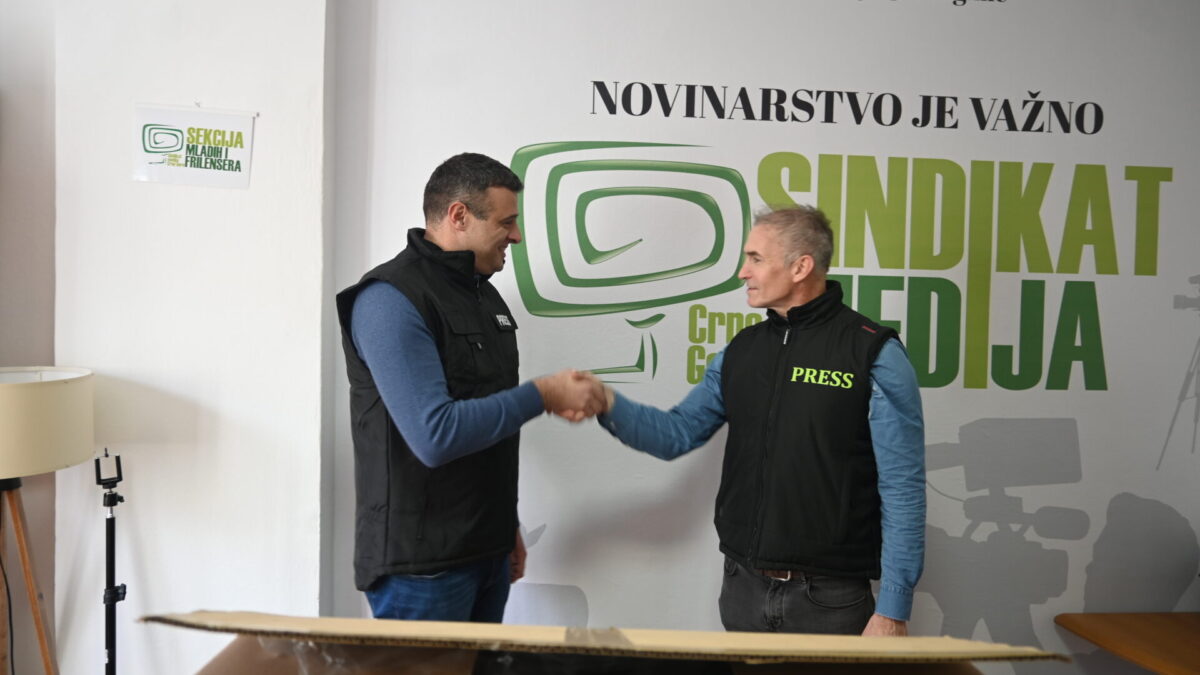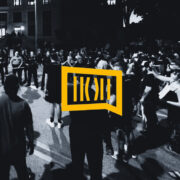
At the conference “Increasing the Safety of Media Workers,” organized today by the Trade Union of Media of Montenegro (SMCG) with the support of the Ministry of Justice, a Protocol on the Protection of Journalists was signed.
This document represents a key step toward establishing a Mechanism for the Safety of Journalists, aimed at strengthening the institutional framework for the protection of media representatives in Montenegro.
The Protocol was signed by Milorad Marković, Supreme State Prosecutor; Tamara Vujović, Minister of Culture and Media; Bojan Božović, Minister of Justice; Dragana Kažanegra Stanišić, State Secretary at the Ministry of Interior; and Radomir Kračković, President of SMCG.

Photo: Ministarstvo kulture i medija
The document was also signed by Tinka Đuranović (Portal Analitika), Marija Tomašević (Radio and Television of Montenegro), Marijana Bojanić (daily newspaper Vijesti and TV Vijesti), Milena Perović (weekly Monitor), and Vladimir Utješinović on behalf of Nikola Marković, President of the Association of Local Public Broadcasters.
Participants at the conference—representatives of institutions, international organizations, and the media community—agreed that the safety of journalists and freedom of expression are the foundation of every democratic society.
Seri: Countries Must Have Zero Tolerance for Attacks on Journalists
Riccardo Seri, Deputy Head of the Delegation of the European Union (EU) to Montenegro, emphasized that journalists play an important role in every democratic society and must be protected from all forms of violence.
There is no place for violence against journalists in a democratic society. Everyone should adhere to the principle of zero tolerance when it comes to attacks and threats against journalists, he stated.
He announced that on 4 November the European Commission’s report on Montenegro’s progress toward the EU would be published, including an assessment of the situation in all areas, among them the safety of media workers.

Photo: Ministarstvo kulture i medija
“Regarding violence against journalists, we have recently seen that the authorities have responded more promptly than in the past”, said Seri, welcoming efforts to improve media safety through the new mechanism.
Haugas: A Signal that Montenegrin Authorities and the Media Community Are Determined to Act Together
Jan Haugas, Head of the OSCE Mission to Montenegro, said that in partnership with key Montenegrin stakeholders, the Mission initiated in 2024 the creation of a Mechanism for the Safety of Media Workers, modeled on the Dutch press safety model PersVeilig.
Such a mechanism requires strong coordination and cooperation between media houses, owners, journalists, editors, the police, and the prosecution, based on signed safety protocols, Ambassador Haugas said.
He added that today’s signing of the Protocol is a practical step forward and a strong signal that Montenegrin authorities and the media community are determined to act together to ensure journalists can do their work without fear.
Marković: Attacks on Journalists Will Not Be Tolerated – the Prosecution Remains Committed to Their Protection
Milorad Marković, Supreme State Prosecutor, said that the signing of the Protocol opens the door to a more organized and efficient approach to the protection of journalists. He also noted that since 2024, cases involving attacks on journalists have been handled as a priority, sending a clear message—such attacks will not be tolerated.
I believe that today we are taking the first step toward an orderly, systemic approach to supporting and protecting journalists and the media—an approach that must, in the end, be effective and real, with the established mechanism reflecting the determination of the state of Montenegro to ensure that journalists are safe in their work and feel safe, Marković said.

Photo: Ministarstvo kulture i medija
He stressed that over the past year and a half the State Prosecutor’s Office has demonstrated precisely such an approach, by establishing procedures for handling cases of attacks on journalists and media property, and by initially and continually supporting the idea of setting up the mechanism.
By applying the Instruction on the Handling of Cases by State Prosecutor’s Offices in Incidents of Threats and Violence Against Journalists, Murders of Journalists, and Attacks on Media Property, adopted in March 2024, significant progress has been made in protecting freedom of expression and the safety of journalists. The Instruction established a clear framework for priority handling of such cases and obliged prosecutors to act without delay, in direct contact with the victims. This has improved both the quality and the speed of proceedings, as well as communication with journalists who are victims, Marković said.
He added that prosecutors regularly report to the Supreme State Prosecutor’s Office on the implementation of the Instruction, and that follow-up reports show consistent application of the law and improved coordination with the police.
“This approach creates an environment in which journalists can do their job without fear, and the message from the Prosecutor’s Office is clear—attacks on journalists will not be tolerated”, he noted.
Marković underlined that the prosecution will remain committed to prosecuting and suppressing all forms and manifestations of criminality that in any way endanger freedom of expression and the safety of journalists.
Vujović: When a Journalist Is Not Safe—Truth Is Not Safe Either
Tamara Vujović, Minister of Culture and Media, stressed that the protection of journalists is an obligation of the institutions, and that the state must react with concrete measures, not just declarations of support.
When the safety of journalists is not guaranteed, truth is endangered as well. A unified message from society as a whole is needed—violence against journalists is unacceptable, Vujović said.
Božović: Freedom of Expression Must Have Institutional Protection
Bojan Božović, Minister of Justice, said that certain progress has been made, but that the level of protection of journalists is still not satisfactory.
We must pay special attention to the protection of women journalists and women in the public sphere, who are often exposed to online threats and attacks, Božović noted.
Kažanegra Stanišić: Journalist Safety Is a Priority, and the Number of Attacks and Threats Shows the Need for a Systemic Approach
Dragana Kažanegra Stanišić, State Secretary at the Ministry of Interior, emphasized that the Ministry treats the safety of journalists as one of its most important issues.

Photo: Ministarstvo kulture i medija
During 2024 and the first three quarters of 2025, dozens of cases of attacks and threats were recorded, including international threats. Criminal and misdemeanor proceedings are ongoing, and three journalists currently have police protection.
The Police Directorate and the Ministry of Interior are working intensively with the prosecution and international partners. Special teams have been established for cases involving attacks on journalists,” she said, adding that the initiative for a €1 million reward for information about the murder of Duško Jovanović is part of a broader institutional response to years of impunity.
Kračković: A Mechanism Inspired by European Practice Will Provide 24/7 Support to Journalists

Photo: Ministarstvo kulture i medija
Radomir Kračković, President of the Trade Union of Media, pointed out that the idea of the Mechanism comes from successful European models and that it will provide journalists with concrete assistance—both legal and psychological.
In just nine months, 20 attacks were recorded, including SLAPP lawsuits, threats, and physical assaults. The Mechanism will help ensure faster and more efficient responses, Kračković explained.
Bošković: Journalists Must Feel They Are Not Alone
Mirko Bošković, legal expert, emphasized that the Protocol lays the foundation for an operational model that enables the systemic protection of journalists. He further explained that through the mechanism, journalists will receive institutional support in real time.
He stressed it is crucial that journalists know they are not alone in moments of crisis, noting that the mechanism will improve processes for reporting incidents, implementing protective measures, and coordinating among institutions.
The conference and the signing of the Protocol symbolize a serious commitment by Montenegrin institutions, international partners, and the media community to creating a safe space for journalists.
Field Experiences
At the panel “What Journalists Need from the Mechanism—Experiences from the Field,” Ana Raičković, a journalist with Pobjeda, said she was revictimized during the handling of her case by the competent authorities after an attack on her.
Interviews should last as briefly as possible, not six hours as, for example, my interview with Prosecutor Vlahović did, she said.

Photo: MediaBiro
Photographer Boris Pejović said that during the incident in which he and his colleague Stevo Vasiljević were attacked in Gornje Zaostro, he felt abandoned and alone.
I’ve been in the field for 25 years. This case was one of the more drastic ones. Most photojournalists have faced some kind of problem, and we’re used to minor incidents and try to solve them ourselves. I’ve worked for 25 years and have never felt more endangered than I did at that event, he said.
Pejović also raised the issue that newsrooms lack internal procedures for crisis reporting and that most newsrooms do not have adequate protective equipment.
Svetlana Đokić, a journalist with TV E, said that the selection of topics journalists cover significantly affects their safety, especially those who investigate crime and corruption.
However, we see that it is not only the choice of topics that is a source of hatred—it is very much the choice of the media outlet we work for as well, which is unacceptable, Đokić said.
Tanja Mandić, a journalist with RTV Budva, noted that there is no psychological support in her newsroom.
I received support at seminars and in conversations with all of you, Mandić said.
She believes that solidarity within the media community is important, as is a commitment by media workers to react in cases of attacks on journalists, regardless of the newsroom they come from.
The panel “What Journalists Need from the Mechanism—Experiences from the Field” was moderated by journalist Dragana Šćepanović.
The conference was organized within the framework of an EU-funded project, and with the support of International federation of Journalists (IFJ) and Union to Union programme.









